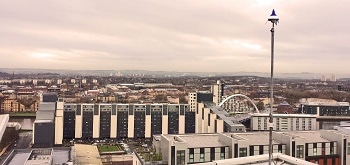Jul 7 2016
Glasgow is paving the way for the next wave of internet technology, the Internet of Things (IoT), thanks to a collaborative project involving Stream Technologies, Semtech Inc., Boston Networks and CENSIS. The consortium concluded an agreement at Mobile World Congress in Shanghai to roll out the next phase of the scheme’s evolution.

Working with Glasgow University, Strathclyde University and Glasgow Caledonian University, the group has installed a wireless IoT network covering 12km2 across the city, including the commercial centre, Merchant City and the West End. The network will enable the development and use of devices such as building and indoor environmental monitors, pollution sensors, tags for tracking valuable assets and social care devices designed to support independent living.
Currently being used to monitor air quality and enhance intelligent transport systems, the introduction of Semtech’s LoRa® geolocation solution is helping deliver the next phase of the technology, with capabilities not previously available. The network can now identify the location of devices without requiring more battery power, opening up a host of new applications. The system provides a much lower power and cheaper way of connecting previously isolated devices, giving the public, developers and businesses the ability to create their own IoT infrastructure to develop and demonstrate new business solutions.
The low power wide area network technology, known as LoRaWAN™, can be used in circumstances as diverse as healthcare providers tracking the behaviour of patients living with dementia, or by waste operators to monitor the location of their skips across a city. The combination of three-kilometre urban range, five-year battery life potential and location determination without power drain, will be transformative in enabling IoT connectivity to new types of device and application.
Nigel Chadwick, CEO of Stream Technologies, said: “This is an exciting development in the story of the IoT and the next wave of internet technology. The LoRaWAN network we’ve set up in Glasgow is one of the most advanced in the world – and is the perfect demonstrator for how it can be rolled out across other cities.
The model will allow businesses to start up their own IoT networks with just one or two devices, and scale-up to the point where they have hundreds, or even thousands, of connected ‘things’. That might sound like it is purely focused on technology companies, but the network could be used by practically any organisation – or even individuals. Its potential is awe-inspiring and it’s happening right here in Glasgow city centre.
Nigel Chadwick,
Semtech is behind the groundbreaking LoRa® technology for IoT applications and has just announced the addition of geolocation capability of devices when messages are received by several base stations.
Semtech needed a representative deployment in both urban and non-urban environments to extensively test our new LoRa geolocation hardware and software, and since the other members of this collaboration have already been successfully working together with LoRaWAN for some time, this was a great opportunity to do so. This project is a valuable opportunity for our team and has helped move the successful deployment of our LoRa geolocation solution forward.
Richard Lansdowne, Senior Director of Network System Solutions for Semtech’s Wireless and Sensing Product Group
Glasgow was selected as the test case because of its similarities to many major metropolitan areas worldwide. The city includes a grid system like major US conurbations, older historic spaces and a mix of urban and extra-urban environments – all of which are ideal for testing low-power radio network performance.
Access to this network could attract multinational technology companies to Glasgow – as well as encouraging a cluster of new businesses to form in the city – as they seek to exploit the technology and develop new products, applications and services on the back of its implementation. The consortium is working on the installation of a similar sensor network in Inverness to monitor conditions in more rural environments.
As a Glasgow based company, we used our local knowledge and experience of wireless technologies to support Stream Technologies to deploy the advanced LoRaWAN network. The implications of the emergence of disruptive technologies, such as LoRaWAN have enormous potential to revolutionise the future of the IoT. To have one of the most advanced LoRaWAN networks which will permit urban infrastructure to become more intelligent – and all right on our doorstep, is an exciting prospect.
Scott McEwan, Chief Executive of Boston Networks
Mark Begbie, Business Development Director at CENSIS, added: “This isn’t about providing faster broadband to businesses – it’s about connecting devices that are currently excluded from the internet and providing services which are not currently possible. LoRaWAN technology is set to address some of the key challenges in the IoT, making long-term battery-powered wireless monitoring possible, with the additional benefit of real-time location information.
“With fewer than 10% of the predicted 30 billion nodes by 2020 likely to be connected to the internet using cellular technology, networks like LoRaWAN are going to become increasingly important. It has the potential to be as disruptive to businesses as the internet has been already to daily life – and, with the conclusion of this agreement in Shanghai, Scotland is at the forefront of making that happen.”
Glasgow is once again leading the way in the technological development of its city centre. Making our urban zones smarter is important for future management and its fantastic to see a collaboration of this scale. An advanced IoT network will bring many benefits, not only to the people living and working in the city, but the region’s overall economy as businesses specialising in the sector are attracted to our offering.
Stuart Patrick, Chief Executive of Glasgow Chamber of Commerce